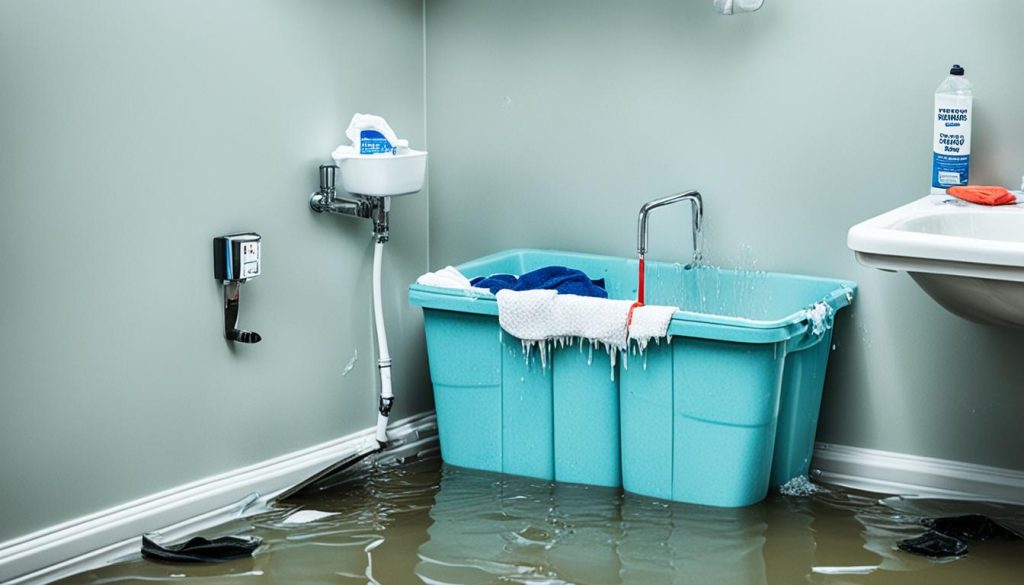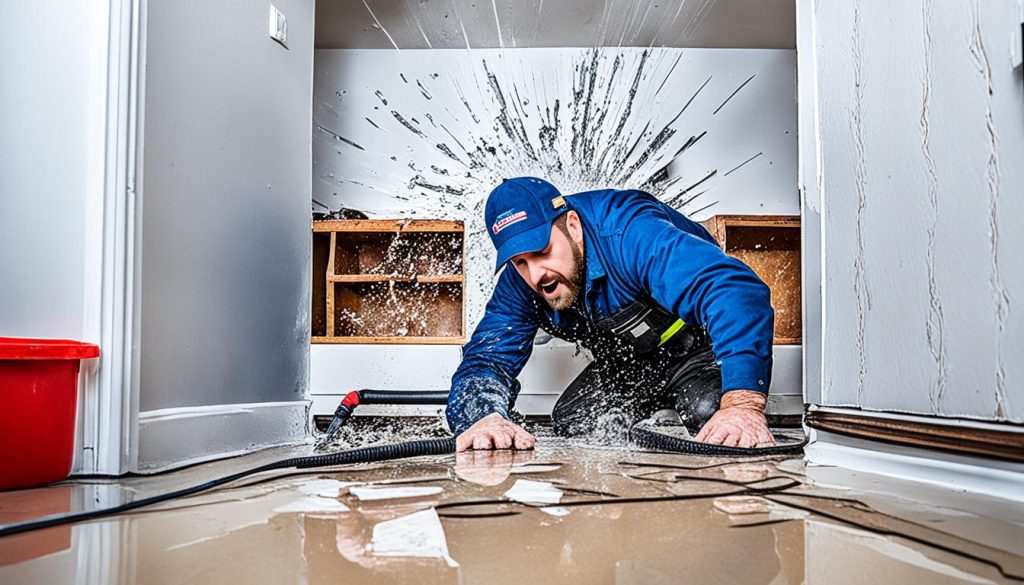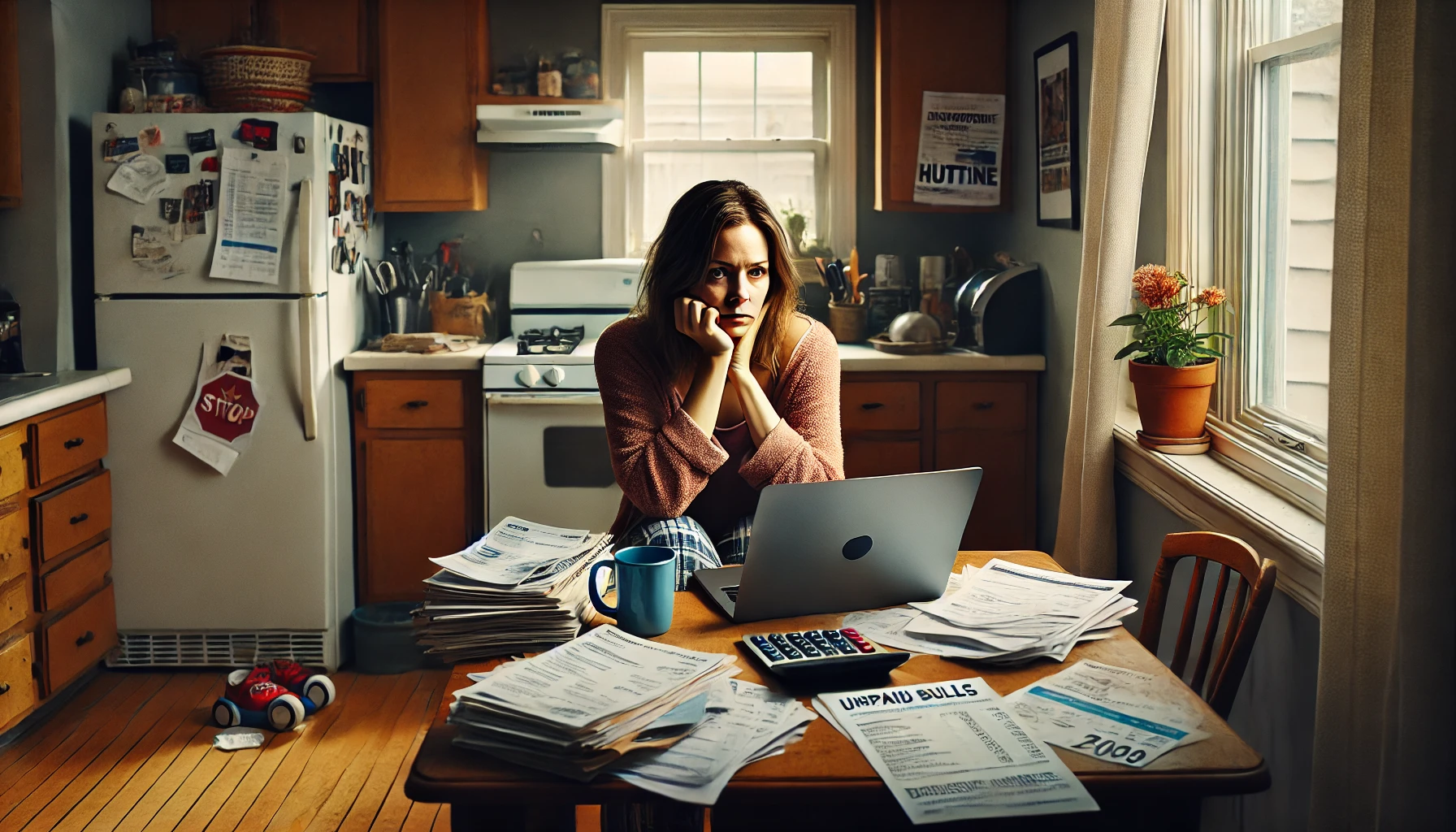Plumbing Emergency Explained: Handle Urgent Issues
Did you know that more than 14,000 gallons of water can be wasted every year due to a small household leak? That’s enough water to fill a swimming pool!
When it comes to plumbing emergencies, time is of the essence. Whether it’s a burst pipe, a sewage backup, or a gas leak, knowing how to handle these urgent issues swiftly and effectively can save you from extensive damage and costly repairs.
Key Takeaways:
- Plumbing emergencies require immediate action to prevent further damage.
- Burst pipes, sewage backups, flooding, and gas leaks are all signs of urgent plumbing issues.
- To handle a plumbing emergency, shut off the main water supply and contact an emergency plumber.
- Common plumbing emergencies include burst pipes, overflowing toilets, leaking water heaters, and clogged drains.
- Preventive measures such as regular maintenance and educating household members can help minimize emergencies.
Identifying a Plumbing Emergency
When it comes to identifying a plumbing emergency, it’s essential to recognize the signs that indicate immediate attention is needed. Urgent plumbing issues such as burst pipes, sewage backups, flooding, and gas leaks require swift action to prevent further damage and ensure the safety of your home.
Here are some key signs that you should be aware of:
- Burst pipes: Sudden bursts resulting in water leaks and potential flooding.
- Sewage backups: Overflowing toilets and drains with foul odors.
- Flooding: Excessive water pooling, especially in areas where it shouldn’t be.
- Gas leaks: The distinct smell of gas or hissing sounds near gas lines.
Recognizing these signs can help you determine when to call an emergency plumber and take immediate action. Protecting your home and ensuring the safety of your family should always be a top priority.
Handling a Plumbing Emergency
When faced with a plumbing emergency, it’s essential to stay calm and take appropriate steps to minimize damage. Acting quickly and effectively can make all the difference in preventing further issues and costly repairs. Here are some essential plumbing emergency tips to help you handle these situations with confidence:
- Shut off the main water supply: The first step in any plumbing emergency is to stop the flow of water to prevent further flooding or water damage. Locate the main water shut-off valve in your home, typically found near the water meter or where the main water supply enters the property. Turn the valve clockwise to shut off the water supply.
- Assess the source of the emergency: Once the water supply is shut off, it’s important to determine the source of the emergency. If you’re dealing with a burst pipe, locate the affected area and use temporary measures like towels or buckets to contain the water. In the case of a gas leak, immediately turn off the gas supply and evacuate the premises. Remember, your safety is a top priority.
- Contact emergency plumbers: Having the contact information of reputable emergency plumbers readily available is crucial in handling a plumbing emergency efficiently. They have the expertise and equipment to quickly resolve the issue and prevent further damage. It’s recommended to research and save the contact details of reliable emergency plumbers in your area before an emergency occurs.
Handling a plumbing emergency requires a level-headed approach and quick action. By following these plumbing emergency tips, you can minimize damage and ensure the safety of your home and loved ones. Remember, when in doubt, always consult a professional plumber for assistance.
| Emergency Situation | Actions to Take |
|---|---|
| Burst Pipe | – Shut off the main water supply – Identify the affected area and contain the water – Contact emergency plumber |
| Gas Leak | – Turn off the gas supply immediately – Evacuate the premises – Contact emergency plumber and gas company |
| Sewage Backup | – Avoid using any plumbing fixtures – Contact emergency plumber – Take precautionary measures to prevent contamination |
| Flooding | – Shut off the main water supply – Identify the source of flooding and mitigate if possible – Contact emergency plumber |
Common Plumbing Emergencies and Solutions
When it comes to homeowners, there are several common plumbing emergencies that can cause panic and inconvenience. It’s essential to recognize these emergencies and know how to take prompt action to minimize damage and resolve the issue effectively.
Burst Pipes
One of the most alarming emergencies is a burst pipe. When a pipe bursts, it can quickly lead to flooding and extensive water damage in your home. If you notice a sudden decrease in water pressure or water pooling around your walls or ceilings, there’s a high chance of a burst pipe. To prevent further damage, immediately turn off the main water supply to your house and contact a professional plumber for assistance.
Overflowing Toilets
An overflowing toilet is another common plumbing emergency that requires immediate attention. It can lead to messy and unhygienic situations, causing water damage to your floor and surrounding areas. If your toilet bowl is filling up and not flushing properly, it’s crucial to act quickly. Turn off the water supply valve located near the base of your toilet, which will help prevent any more water from overflowing. Contact a plumber to diagnose and fix the underlying issue causing the overflow.
Leaking Water Heaters
A leaking water heater can waste energy and pose potential hazards in your home. If you notice water pooling around your water heater or a steady stream of water dripping from it, it’s essential to address the issue promptly. Turn off the power supply to the water heater and shut off the water supply valve. Contact a plumber to inspect the water heater for any leaks and perform necessary repairs or replacement.
Clogged Drains
Clogged drains are a common plumbing problem that can escalate into an emergency situation, especially if they affect multiple fixtures in your home. If you notice slow drainage or water backing up in sinks, showers, or toilets, it’s best to take immediate action. Start by using a plunger or a drain snake to try and clear the blockage. If these methods fail, avoid using harsh chemical drain cleaners and contact a professional plumber to clear the clog and prevent any further damage.
By understanding how to handle these common plumbing emergencies and taking the appropriate actions, you can minimize damage and make the situation more manageable. However, it’s important to remember that each emergency may require the expertise of a professional plumber to ensure a safe and effective resolution.
| Common Plumbing Emergencies | Solutions |
|---|---|
| Burst Pipes | Turn off the main water supply and contact a professional plumber. |
| Overflowing Toilets | Turn off the water supply valve and seek assistance from a plumber. |
| Leaking Water Heaters | Turn off the power and water supply, then call a plumber for repairs or replacement. |
| Clogged Drains | Attempt to clear the blockage with a plunger or drain snake. If unsuccessful, contact a plumber. |
Preventive Measures to Minimize Emergencies
While knowing how to handle plumbing emergencies is crucial, taking preventive measures to minimize these emergencies can save you from unnecessary stress and expenses. By implementing regular maintenance routines, educating household members, and making upgrades, you can significantly reduce the risk of plumbing emergencies.
Maintenance and Inspections
Regular maintenance and inspections of your plumbing system play a vital role in preventing emergencies. By scheduling routine inspections with a professional plumber, potential issues can be identified and addressed before they escalate into major problems. These inspections can detect leaks, corrosion, and other signs of wear and tear that may lead to emergencies.
Proper Drain Usage
Educating household members about what can and cannot be flushed or poured down the drains is essential for preventing clogs and blockages. Avoid disposing of grease, oil, hair, feminine hygiene products, and other non-biodegradable substances in your drains. Instead, dispose of them properly in designated waste containers.
Monitor and Insulate Pipes
Monitoring and insulating exposed pipes, especially during colder months, can prevent freezing and bursting. Insulating pipes with foam insulation sleeves or heat tape can help maintain consistent temperatures and protect against potential damage. Additionally, keeping cabinet doors open under sinks during cold spells allows warm air to circulate around the pipes.
Upgrade to Low-Flow Fixtures
Upgrading to low-flow fixtures, such as faucets, toilets, and showerheads, can help conserve water and reduce the risk of leaks. These fixtures are designed to use less water without compromising performance. By making this simple switch, you not only contribute to water conservation efforts but also decrease the chances of experiencing leaks and water-related emergencies.
Visualizing the Benefits
To visualize the benefits of preventive measures, refer to the table below:
| Preventive Measure | Benefits |
|---|---|
| Regular maintenance and inspections |
– Identifies potential issues – Prevents emergencies – Saves money on expensive repairs |
| Proper drain usage |
– Prevents clogs and blockages – Maintains proper drainage |
| Monitor and insulate pipes |
– Prevents freezing and bursting – Protects against water damage |
| Upgrade to low-flow fixtures |
– Conserves water – Reduces the risk of leaks – Saves on water bills |
By implementing these preventive measures, you can significantly reduce the likelihood of encountering plumbing emergencies. Not only will you minimize stress and expenses, but you will also ensure the longevity and functionality of your home’s plumbing system.
Calling an Emergency Plumber
When faced with a plumbing emergency, knowing when to call an emergency plumber is crucial. If the situation poses an immediate risk to your health, safety, or property, it’s best to contact an emergency plumber right away.
Provide clear and concise information about the emergency, including its nature and location. Being prepared to answer any questions the emergency plumber may have and following their instructions can help expedite the resolution of the issue.
Before making the call, it’s important to evaluate the urgency of the situation. In some cases, if it can wait until regular business hours, it may be more cost-effective to schedule a non-emergency appointment. However, if the emergency requires immediate attention, don’t hesitate to call an emergency plumber. They have the expertise and tools to handle urgent plumbing issues effectively.
| When to Call an Emergency Plumber | When to Schedule a Non-Emergency Appointment |
|---|---|
| If there is a burst pipe | If you have a slow-draining sink |
| If there is a sewage backup | If your toilet is running constantly |
| If there is flooding in your home | If you have a minor faucet leak |
| If there is a gas leak | If you need installation services |
Conclusion: Handling Plumbing Emergencies with Confidence
Knowing how to handle plumbing emergencies is essential for every homeowner. By being prepared and taking immediate action, you can prevent potential disasters and costly repairs. When faced with a plumbing emergency, remember to stay calm and follow these steps:
– Shut off the main water supply to minimize flooding and water damage.
– Contact a reputable emergency plumber who can provide swift solutions and expert assistance.
In addition to handling emergencies, preventive measures can significantly reduce the occurrence of plumbing issues. Regular maintenance, educating household members about proper usage, and insulating exposed pipes during colder months all contribute to a more reliable plumbing system.
With the information and tips provided in this guide, you can handle plumbing emergencies with confidence and safeguard the well-being of your home for years to come.
- Investing Wisely: How Windows & Doors in Boost Property Value and Financial Health - April 24, 2025
- The Financial Impact of Personal Injuries: Why Legal Help Matters for Business Owners - April 16, 2025
- The Hidden Financial Costs of Domestic Assault: What Business Owners Need to Know - April 16, 2025













